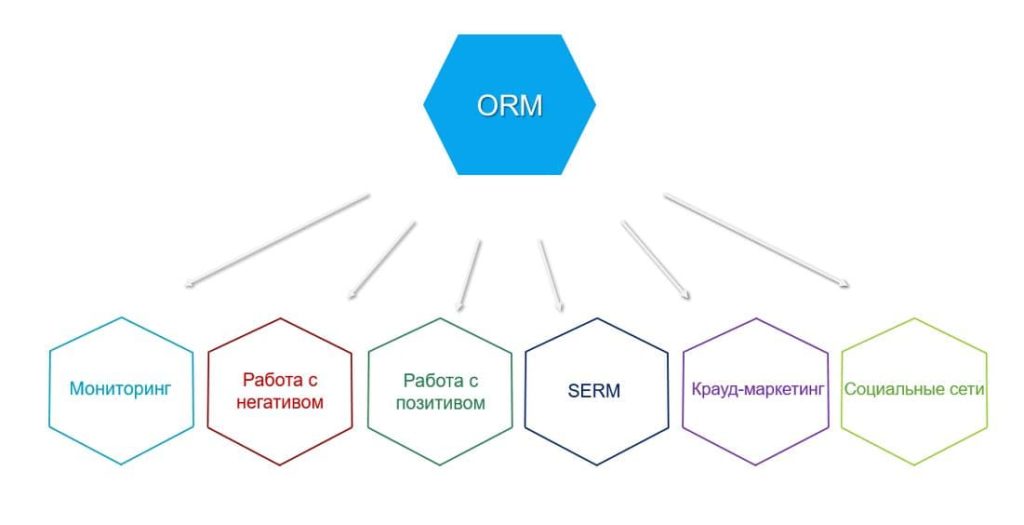What is SERM and how does it differ from reputation management?
CERM (Search Engine Reputation Management) is a set of measures used to manage a company's reputation in search engines. Unlike traditional reputation management, SERM focuses on creating and maintaining a positive impression of a company or individual in search results. CERM helps monitor and improve visibility and reputation in search engines, ensuring that first impressions of a company are positive.
The main difference between SERM and traditional reputation management is its focus on managing the information users receive about a company when searching online. While traditional reputation management aims to create a positive overall impression, SERM focuses on search engines, where most users obtain information about a company.
SERM encompasses a number of strategies and methods aimed at managing a company's reputation in search engines. One such strategy is content optimization. This involves creating high-quality, informative, and useful content that will appear in search results and convey a positive impression of the company. Another method is managing reviews and comments to maintain a company's positive image in search engines.
Furthermore, SERM also includes search engine reputation monitoring and analysis to promptly respond to negative reviews or information. Prompt responses and appropriate replies to negative comments can significantly reduce the impact of negative materials on a company's overall reputation.
However, it's important to note that SERM isn't a panacea for all reputational issues. It focuses solely on search engine reputation management, and comprehensive reputation management requires a comprehensive approach that includes media strategies, social media management, and other tools.


Evaluating the effectiveness of search engine reputation management
Reputation management in today's digital world is becoming increasingly important for companies and individuals. Reputation management in search engines such as Google, Yandex, Bing, and others is particularly crucial. Since these search engines are the first place potential clients, partners, and employers turn to for information, they have a huge impact on the perception and reputation of a company or individual.
Evaluating the effectiveness of search engine reputation management is an essential tool for determining the effectiveness of strategies and tactics. When properly approached, it allows one to assess how effectively reputation management influences a website's or information's ranking in search results, as well as the quality and relevance of information presented about a company or individual.
The following methods and metrics can be used to evaluate the effectiveness of search engine reputation management:
- Search engine ranking monitoring: Monitor the rankings of keywords related to your company or person in search engines. Regular monitoring will help you identify any changes affecting your rankings and allow you to take action to improve your reputation.
- Traffic Analysis: Study the organic traffic coming to your website from search engines. Evaluate which queries drive visits and how changes in reputation impact the quantity and quality of traffic.
- Content Evaluation: Analyze the quality of content related to your company or person in search results. Ensure that the information presented about you is accurate, relevant, and positively impacts your reputation.
- Measuring Reputation Signals: Study what signals and information about a company or individual are displayed in search results. Assess their quality and relevance. Check if any negative information is displayed and take steps to eliminate or mitigate it.
- Social Monitoring: Monitor discussions and mentions of your company or person on social media and online communities. Assess their tone and impact on your reputation. Take action to address negative reviews or comments.
- Customer Feedback: Monitor customer reviews and ratings of your business or individual online. Pay attention to negative reviews and take steps to resolve them and improve your reputation.
Assessing the effectiveness of search engine reputation management requires a systematic approach and ongoing monitoring. Regular analysis will help identify weaknesses and take steps to improve your reputation. Strive to ensure your company or individual is presented in the best possible light by search engines, and you will succeed in building and maintaining a positive reputation that will contribute to your goals and success.

SERM audit: definition and frequency of implementation
SERM audit is an important tool in search engine reputation management. SERM (Search Engine Reputation Management) encompasses a range of activities aimed at monitoring and maintaining the positive reputation of an organization, brand, or individual in search results. SERM audit is a systematic process of analyzing and assessing the status and effectiveness of search engine reputation management.
The main goal of a SERM audit is to identify the strengths and weaknesses of the current reputation management strategy, as well as potential problems and risks. It allows you to assess how successfully an organization manages its reputation in search engines and what actions can be taken to improve it.
The SERM audit includes an analysis of the following aspects:
- Search Engine Positioning: Assessing the presence and relevance of positive and negative search results associated with an organization or brand. This helps determine how well a company's reputation is maintained in search engines.
- Monitoring and Feedback: Analyzing reviews, comments, and discussions about an organization or brand online. This allows us to identify negative opinions and reactions, as well as identify trends and potential problems.
- Content and SEO Strategy: Checking the quality and relevance of content, search engine optimization, and keyword and tag usage. This helps determine how effectively search queries are being used and how to improve search visibility.
- Social Media and Online Presence: Analyzing the activity and effectiveness of an organization or brand's presence on social media, blogs, forums, and other online platforms. This allows us to determine how effectively messages and communication are managed online.
SERM audits should be conducted regularly to stay informed about changes and dynamics in search engine reputation. It is recommended to conduct an audit at least once a year or whenever significant changes occur within the organization or its environment. This will help promptly identify and resolve issues, as well as adapt your reputation management strategy to changing conditions.

SERM Strategy: What Can Be Done?
After completing the audit, it's important to develop a SERM strategy—a step-by-step plan that takes into account each identified resource. This document outlines specific steps, such as removing a resource from search results or changing the sentiment of reviews. It also describes budget constraints, information on link acquisition, and other necessary measures.
SERM specialists can change a company's image in search results using a combination of legal methods and SEO. In some cases, they can influence the resource's administration, change the tone of reviews, and even lower the brand rankings of some resources.
Below are some methods for working with reputation in search results:
- Changing negative content to positive and improving your company's rating can be done by developing an action plan that includes offering customers discounts for leaving reviews, commissioning positive reviews, and other measures. On some platforms, such as Wikipedia, you can make changes to your texts yourself.
- Removing links from search results is the responsibility of digital lawyers. However, not all resources are willing to remove information. The internet is changing rapidly, and laws don't always keep up.
- Reducing the ranking of negative links in the top 10 or top 20 results using SEO so that they rarely appear in user searches. Positive pages, on the other hand, should be promoted in search results. However, there are resources that are impossible or difficult to displace. For example, when searching for hotels, it's impossible to exclude Booking.com from the top results.
- Another example is TripAdvisor. It can't be excluded, but the tone of reviews on this platform can be changed. To this end, you can run promotions, such as "leave a review and get a free cocktail." There is a whole list of other platforms that require collaboration, such as Banki.ru for credit institutions, Booking.com for hotels, Kinopoisk for movies, Yandex.Maps, and Google Maps. SERM specialists must be proficient in working with these platforms and understand their algorithms.

Choosing a Search Engine Reputation Management Specialist
In today's digital world, where online presence plays a key role in business success, search engine reputation management (SERM) is becoming increasingly important for companies and individuals. SERM specialists play a significant role in maintaining and improving online image, helping to control the information displayed in search engines and shaping public opinion about a company or individual.
However, choosing the right search engine reputation manager can be a challenging task. It's important to consider several key factors when making this decision.
First, experience and expertise are fundamental criteria when selecting a SERM specialist. Their knowledge and understanding of search engines, ranking algorithms, and the basic principles of reputation management should be the starting point. Research potential candidates' experience, resumes, and portfolios to learn about the projects they've successfully completed and the results they've achieved.
Secondly, pay attention to the specialist's reputation and reviews. Find out what their clients, partners, and colleagues say about them. Check their online profiles, including social media and professional platforms. Reviews and recommendations can give you an idea of the specialist's quality of work and reliability.
The third important factor is understanding your industry or niche. The ideal SERM specialist should be familiar with the specifics of your industry, understand your target audience, and have an understanding of the factors that influence reputation in your field. Keep in mind that reputation varies across industries, and the specialist should be prepared to navigate these.
Another important aspect is communication skills. A SERM specialist should be able to communicate effectively with you and your team to understand your goals and needs. They should be prepared to provide regular updates on progress and results, as well as ensure transparency in the reputation management process.
Don't forget to consider your budget, too. Search engine reputation management can be a significant investment, so it's important to find a professional whose services align with your budget. Discuss the cost and terms of cooperation before making a decision.
In conclusion, choosing a search engine reputation manager is an important strategic step for your business or individual. Consider their experience, reputation, industry understanding, and communication skills to make an informed decision. Once you find the right SERM specialist, they will help you effectively manage your reputation and achieve your online goals.
The Role of SERM in Reputational Scandals
In an age where information about companies and individuals is accessible with a single click, reputation plays a vital role in the success of a business or career. However, no one is immune to potential reputational scandals, which can cause serious damage and undermine the trust of clients and partners. In such situations, SERM (Search Engine Reputation Management) – a specialized approach to managing reputation in search engines – comes to the rescue.
SERM plays a vital role in reputational scandals, helping to minimize negative consequences and restore trust in a company or individual. SERM's core idea is to control the information users find in search results. In the event of a reputational scandal, SERM helps actively influence search queries and reduce the visibility of negative content, replacing it with positive content and information that can restore trust.
The role of SERM in reputational scandals is to empower companies and individuals to manage their online reputation, minimize negative impacts, and restore user trust. SERM helps actively influence search results, control the information users see about a company or individual, and create a positive image. It's important to note that SERM isn't the only solution, but it effectively complements other reputation management strategies and can become an indispensable tool in resolving reputational issues.
Conclusion
SERM (Search Engine Reputation Management) marketing is an essential tool for reputation management in today's digital world. This approach to search engine reputation management allows companies and individuals to control the information users see about them and actively influence search results.
SERM marketing is an integral part of a reputation management strategy and helps minimize the negative impact of reputational scandals, restore trust, and create a positive image. It relies on content optimization, search query monitoring and analysis, user feedback management, social media engagement, and other strategies.
SERM marketing offers several advantages. Firstly, it allows companies and individuals to actively shape their image in search engines, control information, and create positive content. Secondly, SERM marketing allows for prompt responses to negative content and eliminates its impact on reputation. SERM marketing also increases the visibility of positive content and attracts the attention of the target audience.
However, it's important to remember that SERM marketing isn't a panacea and requires a systematic approach. Companies need to conduct SERM audits regularly and also implement other reputation management strategies, including high-quality customer service, effective communication, and business transparency.
Overall, SERM marketing plays a vital role in today's world, where reputation is a key factor for success. It helps companies and individuals manage their image, minimize the risk of reputational scandals, and build long-term relationships with clients and partners. Integrating SERM marketing into a comprehensive reputation management strategy is becoming an increasingly necessary and effective tool for achieving success in the digital age.







